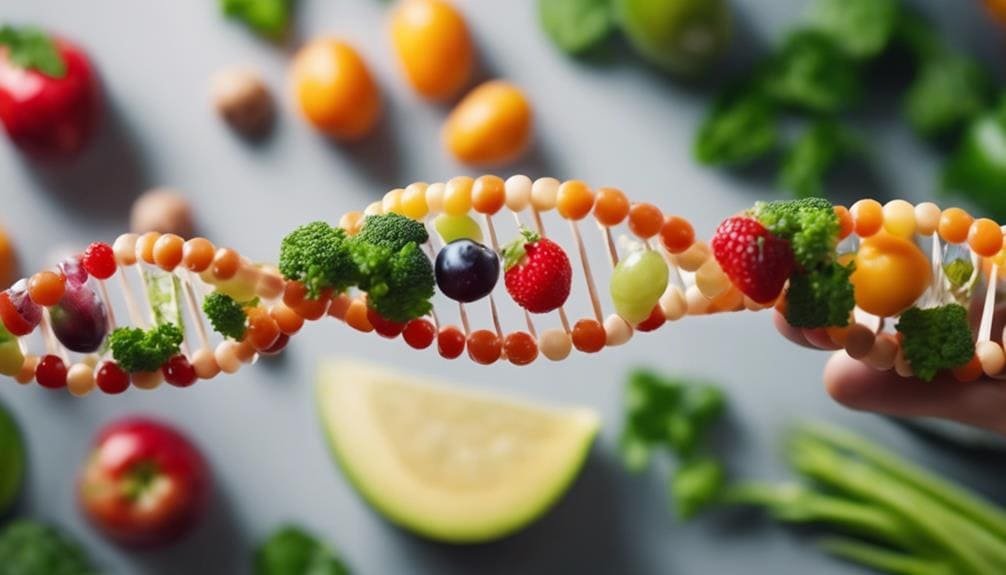In exploring nutrigenomics in the food industry, we uncover a realm where genetic information merges with dietary choices to shape personalized nutrition solutions.
The intriguing interplay between our genetic makeup and food components opens doors to a new era of customized dietary plans.
As we navigate through this landscape, we encounter innovative ways in which food companies are reshaping their products to align with individual genetic profiles.
The implications of this approach go beyond mere sustenance, paving the way for a future where food is tailored not just for taste but for optimal well-being.
Nutrigenomics Overview in Food Industry
In the food industry, we leverage nutrigenomics to develop personalized nutrition products tailored to individual genetic information. This approach allows us to understand the intricate relationship between food, genetics, and human health. By studying how different genes interact with dietary components, we can create customized dietary plans that align with a person's genetic makeup. Research in nutrigenomics has shown that genetic variations can influence how individuals respond to specific nutrients, impacting their overall health outcomes.
Genetic predispositions play a significant role in shaping our dietary requirements and metabolic processes. Through nutrigenomics, we can identify specific genes that influence how our bodies metabolize nutrients, such as fats, carbohydrates, and proteins. This knowledge enables us to tailor food products that cater to an individual's unique genetic profile, promoting better health and well-being.
In the food industry, nutrigenomics is revolutionizing the way we approach nutrition. By offering personalized nutrition based on genetic insights, we can enhance health management strategies and improve overall wellness. Food companies are now able to develop products that consider the genetic diversity of consumers, moving towards a more personalized and targeted approach to dietary recommendations. Nutrigenomics is at the forefront of shaping the future of nutrition, providing tailored solutions that cater to individual genetic needs.
Personalized Nutrition Through Nutrigenomics

Utilizing nutrigenomics, we tailor personalized nutrition plans based on individual genetic profiles in the food industry. This approach allows us to create customized nutrition products that cater to specific genetic variations, offering targeted dietary interventions for individuals. By understanding genetic differences, we can develop personalized food solutions that address individual genetic needs, ultimately enhancing overall well-being.
Key Points:
- Customized Nutrition Products: Nutrigenomics helps us design products that align with the unique genetic profiles of consumers, ensuring they receive the most suitable dietary options.
- Targeted Dietary Interventions: Through nutrigenomics, we can implement precise dietary interventions that focus on addressing individual genetic variations, promoting better health outcomes.
- Enhanced Well-being: Personalized nutrition based on genetic profiles not only meets individual genetic needs but also contributes to overall well-being by providing tailored dietary solutions.
In essence, the integration of nutrigenomics in the food industry enables us to move beyond generic dietary recommendations and towards a more personalized approach that considers the genetic differences among consumers. By offering personalized nutrition plans, customized products, and targeted interventions, we can better serve individuals seeking to optimize their health through tailored dietary solutions.
Genomic Insights in Food Production

Drawing on genomic insights, the food industry optimizes production processes by leveraging genetic variations in crops and livestock. Genomic insights provide valuable information for developing biofortified crops with enhanced nutritional profiles, promoting consumer health. By understanding genetic diversity, targeted breeding programs can be implemented to improve crop resilience and yield within the food production processes.
Furthermore, genomics plays a crucial role in identifying genetic traits responsible for taste, texture, and nutritional content in food products.
These insights enable the food industry to create personalized nutrition products tailored to specific genetic profiles, offering optimized health outcomes for consumers. Through the utilization of genomic tools, food producers can enhance the efficiency of their operations, ensuring the delivery of high-quality and nutritious products to the market.
Impact of Nutrigenomics on Food Quality

Enhancing food quality through nutrigenomics involves tailoring products to individual genetic profiles, leading to improved health outcomes and well-being. By leveraging nutrigenomics in the food industry, personalized nutrition can be achieved through the understanding of genetic variations and the development of targeted dietary plans for consumers. Food companies are now able to create customized nutrition products that cater to specific genetic needs, thereby revolutionizing food quality by integrating genetic information to offer personalized dietary interventions.
Key Points:
- Personalized Nutrition: Nutrigenomics allows for the customization of dietary plans based on individual genetic profiles, optimizing health outcomes and well-being.
- Targeted Dietary Plans: Understanding genetic variations enables the design of specific dietary interventions that address unique genetic needs of consumers.
- Customized Nutrition Products: Food companies utilize nutrigenomics to develop tailored nutrition products that align with the genetic profiles of individuals, enhancing the overall quality and effectiveness of these products.
Future Trends in Nutrigenomics Integration

In the evolving landscape of the food industry, the integration of nutrigenomics is paving the way for personalized nutrition plans based on genetic profiles. As we delve into the future trends of nutrigenomics integration, it becomes evident that personalized nutrition is at the forefront of innovative product development. By leveraging genetic insights, targeted dietary interventions tailored to individual genetic profiles offer significant potential for disease prevention and management. This integration allows for the creation of personalized food recommendations, enhancing health outcomes through tailored nutrition plans.
The future of nutrigenomics in the food industry is deeply rooted in optimizing health through personalized approaches. By understanding how genetic variations influence nutrient metabolism and overall health, tailored nutrition plans can be designed to meet individual needs effectively. This personalized approach not only helps in preventing diseases but also in managing existing conditions more efficiently.
Moreover, the integration of nutrigenomics opens doors for formulating food products that cater to specific genetic profiles. This tailored approach ensures that individuals receive the necessary nutrients in a form that's best suited for their genetic makeup, ultimately leading to improved health outcomes. As we continue to advance in this field, the potential for nutrigenomics to revolutionize personalized nutrition and health management is vast.
Frequently Asked Questions
How Can Nutrigenomics Be Applied in the Development of New Food Products in the Food Industry?
In developing new food products, we focus on flavor enhancement, ingredient optimization, health benefits, consumer preferences, market trends, product innovation, nutritional value, quality control, cost efficiency, and food labeling. Our approach integrates nutrigenomics for personalized nutrition solutions.
What Are the Ethical Considerations Surrounding the Use of Nutrigenomics in Personalized Nutrition?
When considering personalized nutrition with nutrigenomics, ethical reflections must encompass privacy, consent, genetic fairness, cultural impacts, data security, equality, consumer empowerment, regulations, transparency, and research ethics to ensure responsible implementation.
How Do Genomic Insights in Food Production Impact Sustainability and Environmental Concerns?
Genomic insights in food production enhance sustainability by optimizing nutrient profiles, reducing waste, and conserving biodiversity. Genetic modification supports resilient crops, addressing environmental concerns and aligning with consumer preferences for healthier, eco-friendly choices.
Are There Any Regulatory Challenges in Implementing Nutrigenomics for Improving Food Quality and Safety?
Addressing regulatory challenges in implementing nutrigenomics for food quality and safety involves ensuring accurate genetic testing, harmonizing industry standards globally, protecting consumer privacy, and translating genetic data into actionable insights. Industry standards and public perception are key considerations.
What Are Some Potential Risks or Limitations of Integrating Nutrigenomics Into the Food Industry in the Future?
We see potential risks and limitations in integrating nutrigenomics into the food industry. Concerns include consumer privacy, data accuracy, industry standards, genetic testing costs, potential biases, and public perception. These factors must be addressed for successful implementation.
Conclusion
In conclusion, nutrigenomics in the food industry is like a finely tuned symphony, harmonizing genetic information with dietary choices to create personalized nutrition plans.
By delving into the intricate melodies of our DNA, food companies can compose tailored menus that cater to individual needs, optimizing health outcomes.
This innovative approach not only elevates the quality of food products but also orchestrates a new era of precision nutrition that resonates with consumers on a genetic level.
